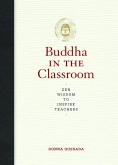 My students and I were talking about the aging cover model in the story, how she was willing to go into debt just to get her neck done. In her warped sense of reality, maintaining the appearance of youth and the false promise of hope that she might have a second spin in this harsh industry, it made perfect sense. This story is part of a grouping of short anecdotes, called The 10 Houses of Suffering, that I wrote to give a better idea of what Buddha really meant by Dukha—the root of human suffering.
My students and I were talking about the aging cover model in the story, how she was willing to go into debt just to get her neck done. In her warped sense of reality, maintaining the appearance of youth and the false promise of hope that she might have a second spin in this harsh industry, it made perfect sense. This story is part of a grouping of short anecdotes, called The 10 Houses of Suffering, that I wrote to give a better idea of what Buddha really meant by Dukha—the root of human suffering.
Then one student asked a reasonable question about our right to spend money on whatever makes us happy:
Student: Isn’t it our right, as mature individuals, to buy things as we like? I mean, what if the new BMW…or the new iPhone…or the new Kobe shoes, makes me happy?
Me: In a practical sense, yes.
But don’t miss the subtle implications of what you’re being asked to consider. If, as the Four Noble Truths go on to explain, our deep-rooted discontent and enduring lack of fulfillment is caused by incessant desires, then those desires must either be inherently wrong or else misguided. And our equally ingrained tendency to cling to stuff, must derive from some confusion on our part, about what it is we’re looking for. Whether it’s the new techie gadget, hairdo, nose job, your college admission letter, or something more intangible, like your idea of what life will be like once you get to UCLA, desires crop up like weeds, with a new one popping up to replace the old one, just as quickly as it’s satisfied.
So we fasten our grip, time after time, around some new fantasy that we think will fix everything. So the pickle we find ourselves in, is about more than the consuming. It’s about the wanting. It’s about what we’re looking for and the ways we go about finding it.
The drug addict (one of the 10 Houses) has the right to dope himself up one more time, for that quick fix, the instantaneous thrill and quick-lived sensation of gratification. But from the outside looking in, we see that he’s sedating himself into a half-dead stupor, an action that he’ll repeat until his death. Unless he wakes up.
This is the shadow-side of all attempts, in fact, to find happiness through external means. They are interminable and our desire for them is insatiable.
The more profound question is whether we are akin to this fellow.
For millions of people, turning on the TV is automatic. But consider the message that is relayed, the minute it lights up: if we wear Chanel No. 5, you’ll find ecstasy; if you lose 10 pounds before the holidays, life will be perfect; if you’re a bald man and you suddenly grow hair, five bikini-clad 20-year-olds will come and sit on your lap; if you win the lottery, you’ll live happily ever after; if you party in Las Vegas for the weekend, and lie to your partner about your whereabouts, your problems will disappear, and it will be your secret.
I would like to clarify a common misperception about spiritual disciplines and desires. We’re not talking about just any desires, but rather, the desires for things that we think will make us happy.
And that’s the crux of it…those things then become conditions of our happiness.








